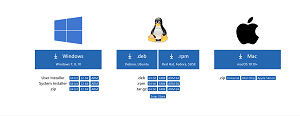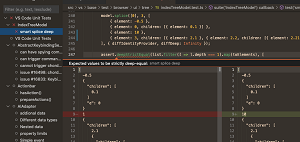News
VS Code Now Has Apple Silicon Builds for Native Mac Development
Goodbye Rosetta, hello M1. Visual Studio Code has been updated with new builds that let it run natively on machines with Apple Silicon (M1), the company's own ARM64 chips.
That means VS Coders using Macs can now choose from three downloads: Universal, Intel Chip and Apple Silicon.
The default download is now the Universal Build, running on all Macs natively, while the architecture-specific builds (Intel and Apple Silicon) don't have to worry about the "universal" stuff so they are smaller downloads.
"We are happy to announce our first release of stable Apple Silicon builds this iteration," said Microsoft in announcing Visual Studio Code v1.54 (February 2021). "Users on Macs with M1 chips can now use VS Code without emulation with Rosetta, and will notice better performance and longer battery life when running VS Code. Thanks to the community for self-hosting with the Insiders build and reporting issues early in the iteration."
The first graphic below shows how the team added macOS build options in this release, while the second graphic shows the download site as it appeared last month when Linux options were announced.
 [Click on image for larger view.] Build Options (source: Microsoft).
[Click on image for larger view.] Build Options (source: Microsoft).
 [Click on image for larger view.] The VS Code ARM Options for Debian Are Front and Center in Last Month's New Offerings (source: Microsoft).
[Click on image for larger view.] The VS Code ARM Options for Debian Are Front and Center in Last Month's New Offerings (source: Microsoft).
ARM64 chips are increasingly being used in mobile devices, laptops and even desktops because of their low-power requirements and other characteristics.
Many segments of the IT industry are moving to support ARM64 architecture hardware, with one notable example being Microsoft's game-changing .NET 6, a cross-platform, open source umbrella framework for all things .NET. Microsoft last month released the first preview of .NET 6, heading for a GA debut in November, and one of the highlights of the release was an improvement to the runtime that added ARM64 support specifically for Windows Desktop. Preview 1 now has binaries for ARM64 on Windows and Linux builds, but not macOS.
Microsoft also recently made ARM64 pushes for the VS Code C++ extension and a preview of WinUI 3.
For VS Code, Microsoft last month announced it was progressing to fully support Apple Silicon in the Insiders build when it unveiled the January update of VS Code. Full Apple Silicon support (in the Stable build) was supposed to be included in that release, but a problem arose. "Late in the iteration, users reported that on macOS Big Sur 11.2 loading a WASM module crashed the extension host. You can follow along with our investigation of the problem in the upstream issue #115646."
 [Click on image for larger view.] A Failed Test Showing the Difference Between Actual and Expected Values in a Diff Peek View (source: Microsoft).
[Click on image for larger view.] A Failed Test Showing the Difference Between Actual and Expected Values in a Diff Peek View (source: Microsoft).
The February update of VS Code also continues the testing exploration effort that was announced with the January update (see graphic above). While many disparate extension were available for testing, the dev team is exploring a more structured, comprehensive approach to address longstanding developer requests for improved VS Code testing as outlined in the roadmap:
Investigate how VS Code can improve the testing support. Several extensions are already providing testing support, explore what APIs/UIs could be added to improve these testing extensions and the test running experience.
"We continued to make progress on testing in VS Code," the dev team said in the new announcement post. "This month we focused on refining the base experience in VS Code and the extension APIs. We have also published some provisional documentation on testing, which will be fleshed out as the APIs continue to stabilize."
Other highlights of the release as presented by Microsoft include:
About the Author
David Ramel is an editor and writer at Converge 360.